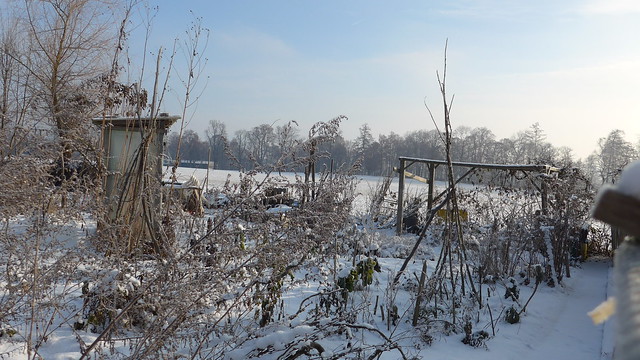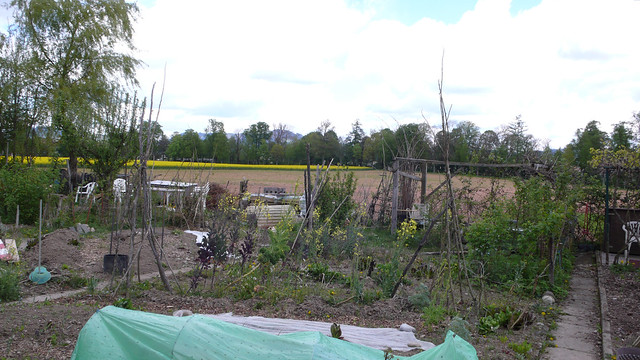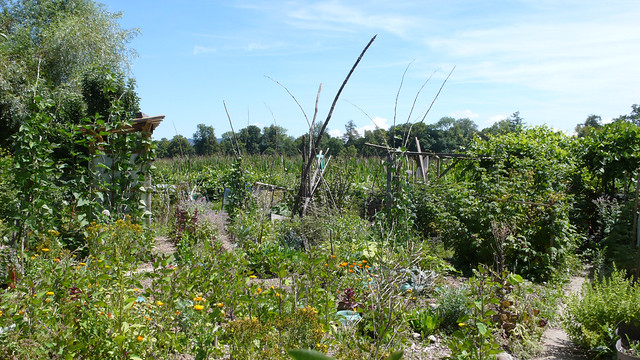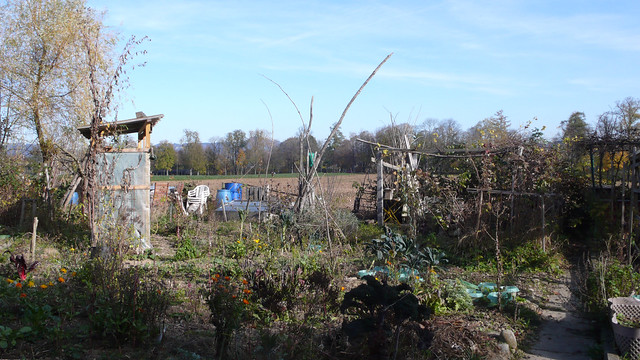
Three years ago we decided to step up our urban farming project to try and move towards self-sufficiency. We initially hoped to be able to produce 80% of our food, but soon realized that many ideas would be impossible to realize. At half-time of the three years we lowered our goal hoping to be able to produce 75% of our vegetables. Mostly getting the chickens for our eggs and finding some way to produce our own milk and grains proved to be impossible currently. The redefined goal was still ambitious, maybe it was still a set up for failure?
Well, the three years have now passed and it is time to draw some conclusions from our experiment in self-sufficient urban farming. This post has been in my drafts for months now, and I have delayed it many times. To say it right out, our experiment has failed. And we decided to stop now. The reasons for this are quite varied.
Anxiety not a zen gardener makes
I already wrote an article on medium detailing some of the psychological aspects in play. What I didn’t mention there is that our third year not only got difficult because of the weather, but also because of an injury that I sustained in May of our third year. Yes, that totally sucked. Gardening is already hard physically, taxing the back, ankles, wrists, but with physical limitations many things are impossible. I am not gonna get into it too much, it is personal and I whine too much as it is. But I think it should be quite obvious how an injury can put a garden project into question.
We need more land, but we already have too much
Currently we do not have access to enough land to really make it work, we would need a lot of space to grow root vegetables to keep in a cellar through the winter, potatoes, carrots, turnips. And grains would take up even more space. Either we go forward, or we take it back a few notches. If we truly want to make this work we need to step it up, work more, find more land, get bigger, and build more fail-saves into our system.
At the same time many people already envy us for the generous 150 square meters allotment that we rent in our community garden, so it feels arrogant to demand more. There is a bit of a dilemma here, other people in our community garden do almost nothing on their plots, they just grow some strawberries so it does not look totally empty. We would like to do more, but somehow in our current system, whoever pays decides. As long as they pay for it, it’s theirs, even to leave empty, hmmm. I wish there could be more flexible models, but this sounds complicated and would question many fundamental assumptions.

Experiments in self-sustenance are for wankers
Oh, the privileged brats we are… As I described in the article on medium with time I got quite annoyed with this “experiment”. Other people are in this situation for real, they do need to grow their own food, or they stay hungry. It suddenly started to feel so damn arrogant to conduct this lofty experiment.
And the other part that started to feel wanky has to do with being a male of the species. I am male. This is just it, a man, when he does simple things, like gardening or cleaning, he seems to always have this urge to turn it into some grand scheme, with a political agenda, and many morals and values attached. A man does not just clean the house, he is optimizing the cleaning work-flow and mansplaining his everyone in sight, whether they care to listen or not. A man does not just keep bees, he is saving the planet and lecturing everyone on the issue. Please excuse us, women, we are just pathetic…
Living in over-regulated Switzerland does not help
I want to make it absolutely clear, this is not some neo-con argument for deregulation. I come from an anarchist point of view. Switzerland can be very tight with it’s regulations. Everything is very structured, needs permits and gets cleaned 16 times a week. One small example, last year we had some extra pumpkin seedlings, and I tried to find a spot for some guerrilla gardening. This took me a few days. When I found the perfect spot, near some bushed, hidden from view, not too close to the road, I happily planted them. After just a few days they were cut down.
Community is key
I am working on another text where I focus on this. It’s a no-brainer. Self-sustenance can only work if you are well connected with other people doing the same. I focused on this quite a bit all through the three years. I found two groups that were focused on similar ideas, I am not gonna name them here, but grew disillusioned with both of them. One group was mostly interested in the social aspect, hanging out together, burning dead animals on grills, drinking beer, which is fine, but not what I was looking for. The other was too conservative for my taste. And when I found out the one of the key members of this environmental project had a day job for one of the biggest polluters in our city, I grew disgusted. Activism as a way to deal with bad conscience feels too short-sighted.

Wait. Are we foodies or self-sustaining urban farmers?
In order to really get this to work the crops need to be well selected, for instance a big portion of the garden needs to be reserved for root vegetables to feed you into and partially through winter. Potatoes, carrots, but also cabbages, leeks. Does that sound a bit dull? Yeah, exactly. We had to be honest with ourselves, in some ways we are foodies, and we really enjoy to grow veggies that are hard to get, Cime di Rapa, Barba die Fratte, Borlotti Beans. They all are excellent food, but they have short seasons and are hard to store (with the glorious exception of the beans of course).
The weather does not help
Again, I should just be grateful and shut up. We here in Switzerland are lucky to have conditions were you can grow food. There is enough top soil, water, sun, all the conditions are there. But it has to be said, that our seasons are very short. The last frost comes mid May, which means all the nice lucious summer vegetables can only go outside then. In July August everything is ready at the same time. Soon you have cucumbers, summer squash, beans, peas in abundance, for a few months. Preserving and fermenting is a lot of work and does help. You need a freezer (we currently do) and a root cellar (we don’t).
What worked
The bees. Amazing. It is wonderful work, it feels relevant.
The wormfarm. Everyone should build and keep one in their basement. Go. Do it now!
Sexy veggies. I love our borlotti beans. Our Cime di rapa. Our funky corn. To grow vegetable favorites that are hard to find in stores.
Endless learning.
Humility.
What failed
No Community. A project like this can only work with support from a community of like minded people.
Great ideas but not enough charisma to make them happen.

